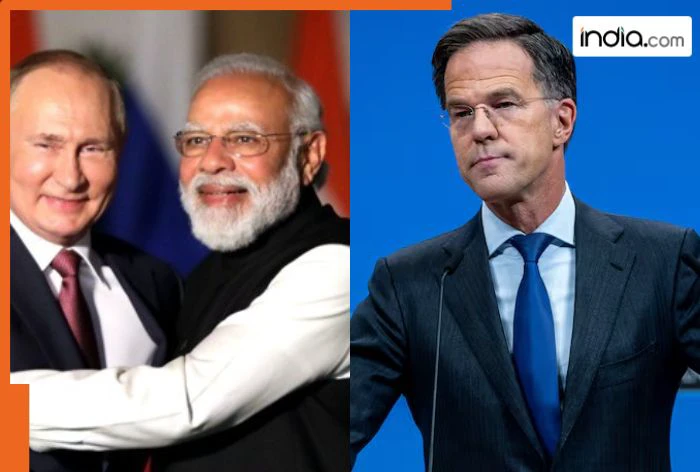The Russia-Ukraine conflict has had implications across the geopolitical, economic, and humanitarian domains. The conflict, which began in 2022, has created numerous global problems.
Politically, it has raised tensions with Russia and Western countries, while arguably strengthening NATO as more countries continue to join its ranks for stability. Economically, the war has caused worldwide prices of fuel and food to increase since both are major exporters.
As Ukrainian troops are continuing to endure setbacks from Russian troops, there is growing frustration from the US and NATO allies. Former US President Donald Trump seems to be directing that frustration towards Russia’s allies, India, and China. The US has put forth a bill that would put a 500% tariff on oil imports from Russia.
Why is NATO putting pressure on India?
Adding to the pressure, NATO Secretary-General Mark Rutte issued a stark warning to India and China on Wednesday, that if Russia is not in peace talks in 50 days, countries still buying Russian oil, will face a 100% secondary tariff. In response, India strongly rebutted the threat and stated that ever since the start of the Ukraine war, Western countries have consistently tried to pressure India over its long-standing relations with Russia. It is to be noted that India has firmly asserted its independence of foreign policy based on its national interest.
Earlier, Trump threatened to impose 100 per cent “secondary tariffs” on Russia if a deal on Ukraine is not reached within 50 days, during his meeting with Rutte in the White HouseTrump also expressed disappointment with his Russian counterpart, Vladimir Putin, and threatened to impose severe tariffs if there is no deal within 50 days.
Meanwhile, moments after Trump’s call for imposing 100 per cent “secondary tariffs” on Moscow, Senators Lindsey Graham and Richard Blumenthal warned countries, including India, of economic sanctions if they continue business with Russia.As per a joint statement by Graham and Blumenthal, China, India, Brazil and other nations “prop up Putin’s war machine” by purchasing “cheap Russian oil and gas”, which they claim is fuelling Putin’s effort in the conflict with Russia.
What role did the S-400 deal play in India’s firm stand?
Previously, Western countries had also issued veiled threats when India announced its purchase of the S-400 missile defense system from Russia. During Operation Sindoor, the Russian S-400 air defense system provided important protection from missile attacks from Pakistan. Not long ago, the United States warned India that continuing with the S-400 deal would put it in danger of CAATSA sanctions (Countering America’s Adversaries Through Sanctions Act) from the U.S. CAATSA sanctions may be enforced on a country if the country engages in a significant defense or related sale from Russia or North Korea or Iran.
According to the news agency PTI report(2022), CAATSA is a tough US law that was brought in 2017 and authorises the US administration to impose sanctions on countries that purchase major defence hardware from Russia.
Why is NATO targeting India over its ties with Russia?
India stood firm against U.S threats and firmly communicated that it would proceed with the Russian S-400 air defense system deal. The right decision was made as the Russian system acted as a shield for India during Operation Sindoor. Eventually, the U.S would issue a waiver by recognizing India’s firm defense agreement with Russia. Now, similar threats are issued by the NATO chief regarding India’s ties with Russia. NATO countries have delivered ammunition and missiles to support Ukraine, but have been unable to subdue Russia. Out of frustration with their inability to control Russia, they are coming for India. It is worth noting that NATO member Turkey is now the third-largest customer for Russian oil.
What did India say in response to NATO’s Russian oil warning?
Meanwhile, on Thursday, the External Affairs Ministry, in a rebuttal to NATO chief Mark Rutte’s remarks on the possibility of secondary sanctions on the purchase of Russian oil, said that securing energy needs of India was an “overriding priority” for the country which is “guided by available offers” and “prevailing global circumstances. “The Ministry of External Affairs further cautioned against “double standards” on the matter.
Addressing a press conference in the national capital, MEA spokesperson Randhir Jaiswal said, “We have seen reports on the subject and are closely following the developments. Let me reiterate and I have said this in the past as well that securing the energy needs of our people is, understandably, an overriding priority for us. In this endeavour, we are guided by what is available in the markets, as well as by the prevailing global circumstances.”
“We would particularly caution against any double standards on the matter,” the MEA Spokesperson said, ANI reported. During the Ukraine war, India not only met their domestic need for energy by importing oil from Russia, it also kept world oil prices from rising sharply. This was beneficial for all oil-importing countries anywhere in the world. India even exported refined oil to Europe and led the way as the largest exporter of oil products to Europe. India, today, is one of the leading buyers of oil from Russia, which is a bit of a sore point for the NATO chief. While the U.S. and NATO countries continually threaten to punish India, India remains a Key ally of the West in the Indo-Pacific region against China. Experts have also maintained that India, despite U.S. or NATO leaders threatening, will continue to operate solely in its national interests. Western countries will not be able to impede India’s decision-making or dictate India’s policy.
